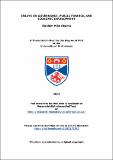Files in this item
Essays on governance, public finance, and economic development
Item metadata
| dc.contributor.advisor | Forgues-Puccio, Gonzalo F. | |
| dc.contributor.advisor | Damjanovic, Tatiana | |
| dc.contributor.advisor | Mitra, Kaushik | |
| dc.contributor.author | Okumu, Ibrahim Mike | |
| dc.coverage.spatial | xii, 162 | en_US |
| dc.date.accessioned | 2014-08-28T14:24:38Z | |
| dc.date.available | 2014-08-28T14:24:38Z | |
| dc.date.issued | 2014 | |
| dc.identifier.uri | https://hdl.handle.net/10023/5282 | |
| dc.description.abstract | This thesis is composed of three distinct but related essays. The first essay studies the role of the size of the economy in mitigating the impact of public sector corruption on economic development. The analysis is based on a dynamic general equilibrium model in which growth occurs endogenously through the invention and manufacture of new intermediate goods that are used in the production of output. Potential innovators decide to enter the market considering the fraction of future profits that may be lost to corruption. We find that depending on the number of times bribes are demanded, the size of the economy may be an important factor in determining the effects of corruption on innovation and economic growth. The second essay presents an occupational choice model in which a household can choose either formal or informal entrepreneurship or at the subsistence livelihood. Credit market constraints and initial wealth conditions (bequest) determine an agent’s occupational choice. Corruption arises when bureaucrats exchange investment permits for bribes. Corruption worsens credit market constraints. Equilibrium with corruption is characterised by an increase (decrease) in informal (formal) entrepreneurship and a decrease in formal entrepreneurship wealth. Since corruption-induced credit constrained households choose informal entrepreneurship as opposed to subsistence livelihood income in the formal sector, the informal economy is shown to mitigate the extent of income inequality. The third essay explains the role of bureaucratic corruption in undermining public service delivery, public finance, and economic development through incentivising tax evasion. The analysis is based on a dynamic general equilibrium model in which a taxable household observes the quality of public services and decides whether or not to fulfil his tax obligation. Bureaucratic corruption compromises the quality of public services such that a taxable household develops incentives to evade tax payment. We show that corruption-induced tax evasion increases the likelihood of a budget deficit, renders tax payable increase counter-productive, and aggravates the negative effect of bureaucratic corruption on economic development. | en_US |
| dc.language.iso | en | en_US |
| dc.publisher | University of St Andrews | |
| dc.subject | Economic development | en_US |
| dc.subject | Growth | en_US |
| dc.subject | Innovation | en_US |
| dc.subject | Inequality | en_US |
| dc.subject | Informal economy | en_US |
| dc.subject | Fiscal policy | en_US |
| dc.subject | Corruption | en_US |
| dc.subject.lcc | JF1525.C66O6 | |
| dc.subject.lcsh | Public administration--Corrupt practices--Econometric models | en_US |
| dc.subject.lcsh | Corruption--Government employees | en_US |
| dc.subject.lcsh | Economic development | en_US |
| dc.subject.lcsh | Informal sector (Economics) | en_US |
| dc.subject.lcsh | Tax evasion | en_US |
| dc.title | Essays on governance, public finance, and economic development | en_US |
| dc.type | Thesis | en_US |
| dc.contributor.sponsor | Commonwealth Secretariat | en_US |
| dc.type.qualificationlevel | Doctoral | en_US |
| dc.type.qualificationname | PhD Doctor of Philosophy | en_US |
| dc.publisher.institution | The University of St Andrews | en_US |
This item appears in the following Collection(s)
Items in the St Andrews Research Repository are protected by copyright, with all rights reserved, unless otherwise indicated.

